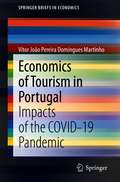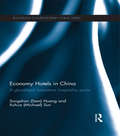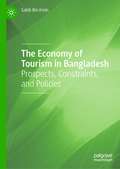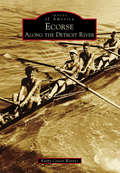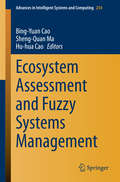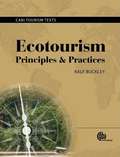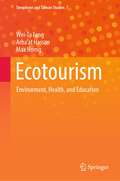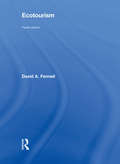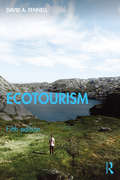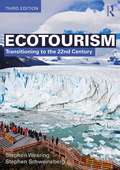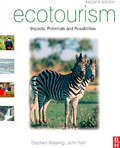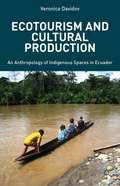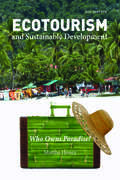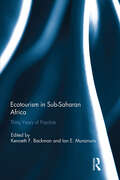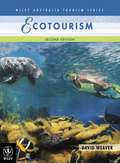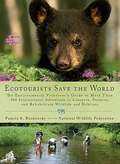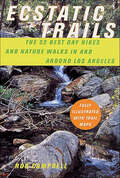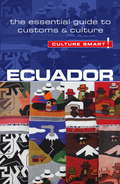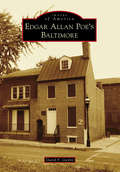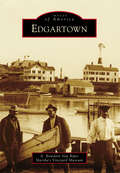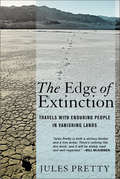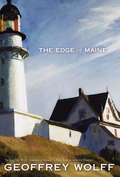- Table View
- List View
Economics of Tourism in Portugal: Impacts of the COVID-19 Pandemic (SpringerBriefs in Economics)
by Vítor João MartinhoThis Brief discusses impacts of the COVID-19 pandemic on the Portuguese tourism sector. Taking into account real-world conditions and the importance of the tourism sector for the Portuguese economy, this book highlights the economic contexts of tourism in Portugal at the regional and municipal levels, discussing pre-pandemic economic frameworks and projecting potential implications for the future. Using data provided by Statistics Portugal, the Brief performs econometric analysis on three cases: new paradigms for overnight stays and guests, changes in tourism revenues and prospective alternatives, and a comparison of effects on changes in number of guests and overnight stays at the regional level. Providing cutting edge analysis of a dynamic global situation, this Brief will be useful for researchers interested in tourism economics and European economics as well as policymakers and industry professionals.
Economy Hotels in China: A Glocalized Innovative Hospitality Sector (Routledge Contemporary China Series)
by Songshan Huang Xuhua SunWhile economy or budget hotels have been popular in western countries since the end of the Second World War, they have only emerged as a sector in their own right in China since the mid-1990s. Indeed, as a new service industry sector, economy hotels in China demonstrate important characteristics which can be used to illustrate and help explain China’s current economic progress more generally. This book provides a comprehensive overview of the economy hotel sector in China. It covers macro-level social-cultural, economic, environmental, geographic and development issues, alongside micro-level consideration of the budget hotel companies’ innovative management and marketing procedures, business expansion strategies, general hotel management and operation issues, as well as an analysis of some leading entrepreneurs in the sector, and in-depth case studies examining the most successful economy hotel companies in China. Huang and Sun argue that the rapid development of budget hotels in China demonstrates how, under the influence of globalisation, Chinese businesses have become more innovative as they apply successful western business models to China. In turn, they show that the China model is fundamentally different in terms of its driving force, which lies purely in its domestic travel market, fuelled by China's continued economic growth. There is therefore much to explore about both China’s market situation and business practices in the economy hotel sector and this book makes an important contribution to our understanding of China’s new business environment. Based on extensive fieldwork and investigation, Economy Hotels in China will be welcomed by students and scholars of tourism, hospitality, business studies and Chinese studies, but it will also appeal to practitioners of business management in these sectors who are interested in China’s development and business opportunities in China.
The Economy of Tourism in Bangladesh: Prospects, Constraints, and Policies
by Sakib Bin AminBangladesh is a land of great natural beauty, with a rich culture. Its tourism industry is one of its greatest motivators for social and economic development - but it does not always climb to the heights of success that one might expect. This book is one of the first to explore tourism in Bangladesh in scholarly detail, examining driving factors behind the growth of the industry, as well as challenges it needs to overcome. It provides recommendations for policy makers, as well as a rich tapestry of scholarly work for researchers interested in Bangladesh, tourism management, and the study of developing economies.
Ecorse: Along the Detroit River
by Kathy Covert WarnesFrench explorers called the Ecorse River the "river of bark," or Ecorces, because the Huron Indians who lived in the villages surrounding it wrapped their dead in the bark of the birch trees that grew along its banks. White pioneers settled on French ribbon farms along the Detroit River, and a small village called Grandport sprang up where the Ecorse River met the Detroit River. By 1836, Grandport, now known as Ecorse, had grown into a fishing and farming center, and, by the 1900s Ecorse had gained fame as a haven for bootleggers during Prohibition, an important shipbuilding center, and the home of several championship rowing teams.
Ecosystem Assessment and Fuzzy Systems Management
by Bing-Yuan Cao Sheng-Quan Ma Hu-Hua Cao"Ecosystem Assessment and Fuzzy Systems Management" is the edited outcome of the 3rd International Conference on Ecosystem Assessment Management (ICEAM) and the Workshop on the Construction of an Early Warning Platform for Eco-tourism (WCEWPE) in Hainan on May 5-12, 2013, Haikou, China. The 3rd ICEAM and the WCEWPE, built on the success of previous conferences, are major Symposiums for scientists, engineers and logistic management researchers presenting their the latest achievements, developments and applications in all areas of Ecosystem Assessment Management, Early Warning Platform for Eco-tourism and fuzziology. It aims to strengthen relations between industry research laboratories and universities, and to create a primary symposium for world scientists. The book, containing 47 papers, is divided into five parts: "Ecosystem Assessment, Management and Information"; "Intelligent Algorithm, Fuzzy Optimization and Engineering Application"; "Spatial Data Analysis and Intelligent Information Processing"; "Tourism Culture, Development and Planning" and "Application of Operations Research and Fuzzy Systems".
Ecotourism
by Ralf BuckleyEcotourism is a useful concept, but not a very well defined one; it has been debated in theory and attempted in practice for nearly two decades. Its key goal is to reduce the net environmental impact of the tourism industry, via mechanisms including minimal impact management measures, education, community involvement, private conservation, contributions to public protected areas, expansion of ecotourism enterprises and mainstreaming of ecotourism principles. Focussing on fundamental ecotourism concepts, this broad-based textbook provides a basis for studies into environment-based tourism. It covers key topics such as the management, economics and potential environmental impacts both positive and negative of this popular and growing sector. Written for tourism students and an ideal resource for undergraduate courses, Ecotourism: Principles and Practices will also interest industry practitioners and researchers. Now you can access additional content items for this textbook. You can download pdfs of powerpoint slides as study aids and to assist in teaching the subject matter. This content is free to own and is available from Griffith University here
Ecotourism: Environment, Health, and Education (Sinophone and Taiwan Studies #7)
by Wei-Ta Fang Arba'at Hassan Max HorngThis book bridges the gap on the critical issues of ecotourism and direct economic assistance to the conservation of local ecological and human resources. It covers various topics and case studies by ecotourism destination and ecotourism route from Sinophone and Taiwanese perspectives. Each chapter of this book includes comprehensive proposes as an important core value for planning and operating ecotourism. According to Sustainable Development Goals (SDGs), this book highlights our balanced understanding of sustainable tourism from the perspective of human ecology. Ecotourism needs to integrate the perspectives of population biology, bioanthropology, biomedicine, and public health and strengthen the connection between human ecology and disease. It is here to provide a comprehensive guide to all fascinating places for ecotourism courses. We encourage the following persons to read relevant chapters: (1) ecotourism entrepreneurs: business operators such as homestays, hot springs, ecological farms, and travel agencies; (2) ecotourism researchers: scholars and experts, university (specialized) college students, primary and secondary school teachers, and other ecotourism, environmental education, resource conservation, tourism and dining, leisure and recreation, other related fields researchers; and (3) ecotourism practice management and planners.
Ecotourism
by David A. FennellEcotourism continues to be embraced as the antithesis of mass tourism because of its promise of achieving sustainability through conservation mindedness, community development, education and learning, and the promotion of nature based activities that were sensitive to both ecological and social systems. The extent to which this promise has been realised is open to debate. Focusing on an array of economic, social and ecological inconsistencies that continue to plague ecotourism in theory and practice, the volume examines ecotourism in reference to other related forms of tourism, impacts, conservation, sustainability, education and interpretation, policy and governance, and the ethical imperative of ecotourism as these apply to the world’s greenest form of tourism. Ecotourism is a growing field attracting increasing attention from students and academics. Fennell provides an authoritative and comprehensive review of the most important issues that continue to both plague ecotourism and make it one of the most dynamic sectors in the tourism industry. It covers a comprehensive range of themes and geographical regions. Building on the success of prior editions, Ecotourism has been revised throughout to incorporate recent research and benefits from the introduction of real-life case studies and summaries of recent literature. An essential reference for those interested in Ecotourism, the book is accessible to students but retains the depth required for use by researchers and practitioners in the field. New chapters on the theory and application of animal ethics; community development in sustainable tourism; and education and learning in the field have added further value to an already very comprehensive volume. This book will be of interest to students across a range of disciplines including geography, economics, business, ethics, biology, and environmental studies.
Ecotourism
by David A. FennellThe new fifth edition of Ecotourism focuses on an array of economic, social and ecological inconsistencies that continue to plague ecotourism in theory and practice, and examines the sector in reference to other related forms of tourism, impacts, conservation, sustainability, education and interpretation, policy and governance, and the ethical imperative of ecotourism as these apply to the world&’s greenest form of tourism. Building on the success of prior editions, the text has been revised throughout to incorporate recent research, including ecotourism taking place in under-represented world regions. It includes new case studies on important themes in research and practice as well as learning objectives in each chapter. David Fennell provides an authoritative and comprehensive review of the most important issues, including climate change and UN Sustainable Development Goals. Ecotourism continues to be embraced as the antithesis of mass tourism because of its promise of achieving sustainability through conservation mindedness, community development, education and learning, and the promotion of nature-based activities that are sensitive to both ecological and social systems. The book debates to what extent this promise has been realised. An essential reference for those interested in ecotourism, the book is accessible to students, but retains the depth required for use by researchers and practitioners in the field. This book will be of interest to students across a range of disciplines including geography, economics, business, ethics, biology, and environmental studies.
Ecotourism: Transitioning to the 22nd Century
by Stephen Schweinsberg Stephen WearingSince the first edition of the title, ecotourism has become a major phenomenon in tourism and society in many countries and regions throughout the world. The profusion of experiences has generated a variety of means of theorizing, analysing and marketing ecotourism, all that have yet to be encompassed in one book. Ecotourism fills the gap by synthesising the changes in thinking and society over the last decade. This third edition has been fully revised and updated to include: updated chapters addressing modern thought and discourse, including neoliberalism, consumer culture and quality management in the ecotourism industry; critical analysis drawn from a range of theoretical frameworks, which models and advances the thinking in ecotourism towards a socio-geographical analysis; new and international case studies from emerging markets such as China and Brazil. Providing a critical introduction to the analysis of tourism from a sociological and geographical perspective, the title is essential reading for higher-level and graduate students and researchers in tourism, sociology and geography. It will also be of interest to environmental groups and practitioners.
Ecotourism: Impacts, Potentials And Possibilities?
by Stephen Wearing John NeilEcotourism: Impacts, Potentials and Possibilities analyzes the impacts of mainstream tourism in first, second and third world countries, and argues the benefits of adopting the philosophical approaches of ecotourism to create a more sustainable tourism industry in every country around the world. Conservation and ecotourism issues are now at the forefront of public opinion. The decline of natural rainforests, loss of endangered species, global warming and land degradation have galvanized public support for conservation. Building on the success of the first edition, this text has been fully revised and updated to include: updated and new international case studies a new chapter devoted to the theory and technique of Rapid Rural Appraisal (the practice whereby communities are empowered to improve their own environment) questions and further readings at the end of each chapter to facilitate student's learning critical analysis of ecotourism explores the movement of ideas around post-modern approaches to the field. Using relevant case studies, Ecotourism examines the potential positive social and environmental benefits of ecotourism and is ideal for both students of tourism and practitioners within the tourism industry. Ecotourism will also be of interest to environmental groups, land managers, academics and planners.
Ecotourism And Cultural Production
by Veronica DavidovEcotourism is a unique facet of globalization, promising the possibility of reconciling the juggernaut of development with ecological/cultural conservation. Davidov offers a comparative analysis of the issue using a case study of indigenous Kichwa people of Ecuador and their interactions with globalization and transnational systems.
Ecotourism and Sustainable Development, Second Edition: Who Owns Paradise?
by Martha HoneyEcotourism and Sustainable Development is the most comprehensive overview of worldwide ecotourism available today, showing how both the concept and the reality have evolved over more than twenty-five years. Here Martha Honey revisits six nations she profiled in the first edition--the Galapagos Islands, Costa Rica, Tanzania, Zanzibar, Kenya, and South Africa--and adds a fascinating new chapter on the United States. She examines the growth of ecotourism within each country's tourism strategy, its political system, and its changing economic policies. Her useful case studies highlight the economic and cultural impacts of expanding tourism on indigenous populations as well as on ecosystems.
Ecotourism in Sub-Saharan Africa: Thirty Years of Practice
by Kenneth F. Backman Ian E. MunanuraSince its first mention in the academic literature, ecotourism has been endorsed by NGOs and governments as the most environmentally sound and locally beneficial method of tourist development. Over the last thirty years sub-Saharan Africa has adopted ecotourism as the primary focus for tourism development; research into this has demonstrated mixed results. In this publication, we seek to explore the actual outcomes for African countries that have developed their tourism policy around the principals and values of ecotourism. The sheer scope and magnitude of the task means that a complete evaluation of ecotourism in Africa is impossible. Instead, included here are spot assessments of various aspects of ecotourism related to conservation, policy development, environment, governance, community and indigenous peoples in southern Africa. The studies cover a wide array of countries, including Botswana, Kenya, Tanzania, Uganda, Ghana, Zimbabwe, and South Africa. Though this is only the beginning of a needed long term evaluation of the positives and negatives of ecotourism, it provides a starting point from which to move forward. This book was originally published as a special issue of the Journal of Ecotourism.
Ecotourism (Second Edition)
by David WeaverEcotourism, second edition has been thoroughly revised to reflect contemporary developments in ecotourism. Building on the strengths of the first edition, the text discusses the significance of ecotourism in the domestic and international tourism sector. Ecotourism origins, markets, venues and impacts form the basis of the first part of the book. Business aspects of ecotourism, external environments, organisations and policies are examined in the second part of the book, along with special environments and activities such as whale watching, islands, polar regions and indigenous territories. The management of ecotourism is covered comprehensively and is illustrated by extensive industry and destination examples derived mainly from the peer-reviewed literature. A highlight of the book is a regional survey of ecotourism that offers comparative insights into ecotourism in Australia, the South Pacific, Asia, Europe, the Americas and Africa. <p><p> Ecotourism is a high yield tourist category within the national tourism industry and issues such as site planning and development, operator obligations and best practices, strategic management and the role of indigenous communities have become crucial professional and industry considerations.
Ecotourists Save the World
by Pamela K. Brodowsky National Wildlife FederationA comprehensive guide to environmental and wildlife volunteer programs throughout the world. This unique site-by-site guide profiles more than 300 programs where volunteers can work in a variety of activities involving conservation and study of wildlife. From the Fur Seal Project of the Earthwatch Institute in St. George Island, Alaska, or identifying and tracking wildlife in the Limpopo Nature Reserve, South Africa, to Blue World Institute's Adriatic Dolphin Project in Croatia, to the tracking program of the Open Minded Project in Kaeng Krachan National Park, Thailand, readers will learn the best ways to "give back" and make the most positive environmental impact during their travels. Each entry includes a profile of the site and organization behind it, as well as location, contact information, category, costs, dates and duration, how to apply, and field notes that include any special concerns, requirements for participation, and suitability.
Ecstatic Trails: The 52 Best Day Hikes and Nature Walks In and Around Los Angeles
by Rob CampbellLos Angeles is a hiker's perfect playground: from enchanted canyons to bountiful beaches, the range of terrain provides an almost endless variety of trails, vistas, and even weather conditions. Organized by level of difficulty, beginning with the most forgiving trails and building up to the toughest, Ecstatic Trails emphasizes the experience of the hike, guiding you to romantic hikes, trails that are right for children, thrill hikes, day trips you can build around a picnic, or intense paths perfect for solitary exploration.Everything a novice hiker or experienced trailblazer needs is here, including:--detailed maps--driving directions--restrictions, including whether dogs are permitted--the amount of time each hike is likely to take--featured elements and trail descriptionsFrom wildflower walks to dramatic waterfall treks, from sunset outings to trails that provide cool breezes in the midst of summer, Ecstatic Trails is packed with a year's worth of happy hiking.
Ecuador - Culture Smart!
by Russell MaddicksSqueezed between Colombia in the north and Peru in the south, Ecuador is named for its location on the Equator and has a landscape so varied that it has been described as a microcosm of every microclimate found in South America. This diversity makes it a magnet for tourists, mountain trekkers, volunteers, and increasing numbers of US retirees looking for a warm, culturally interesting, economical, and safe place to spend much of their time. The country is booming, thanks to high oil prices and investment in tourism, and a massive infrastructure program and the poverty-reduction measures launched by President Rafael Correa have endeared him to the poorest in society. Ecuador's multiethnic population reflects a unique blend of cultures, from traditionally dressed mountain peoples, whose ancestors inhabited their highland villages before the arrival of the Incas, to the Afro-Ecuadorians of Esmeraldas and the Chota Valley and the tribal peoples of the Amazonian rainforest. The Ecuadorians are proud, friendly, hospitable, and hardworking, but to know them well the foreign visitor needs to understand the complex historical divisions between the highlands and the coast, and the rigid class and racial hierarchy that has shaped the country's history. Culture Smart! Ecuador takes you beyond the usual descriptions of where to go and what to see, and gives you an insider's view of the people, their history, their food, and their culture. Special sections are designed to help food lovers get the most out of the menu, assist business travelers to gain an edge on the competition, and show expats, volunteers, and visitors how to meet and get on well with the Ecuadorians, who are as diverse and varied as the country's amazing geography.
Eddy County (Images of America)
by Donna Blake Birchell The Southeastern New Mexico Historical SocietyEddy County's 4,198 square miles were carved from the massive land holdings of Lincoln County, then the largest county in the United States, on February 25, 1889. Early Spanish explorers and Native Americans had used the seemingly endless water supply of the Pecos River, which bisects the county, as a trail to the north. Seven Rivers, the first settlement in the Pecos Valley, battled the newly formed town of Eddy for the honor of remaining county seat. Eddy won by a vote of 331 for and 83 against. Although born in lawlessness and diversity, the county flourished as the discoveries of oil, gas, and potash brought industry to support the established fertile agricultural and cattle foundations. This volume explores the early founding families and pioneers and brings to light many of the long-forgotten towns of Dayton, Lookout, Oriental, and Globe that helped form the Eddy County of today.
Eden (Images of America)
by Sue MinekimeFrom its inception, Eden has been a beautiful place to call home. For generations, the fertile soils of Eden have yielded outstanding fresh produce, feeding countless individuals locally and in other states. Before the days of easy travel between places, Eden had thriving retail, commercial, and industrial areas. One business still produces that unique musical instrument, the kazoo, and thanks to inventors from Eden, tractors ride more comfortably and train travel is safer. The town produced a handful of poets, a well-known artist, a concert pianist, five state assemblymen, a state senator, and a chief judge of the State of New York Court of Appeals.
Edenton and Chowan County, North Carolina (Images of America)
by Louis Van CampConveniently located between three important waterways in Eastern North Carolina, Chowan County, along with its county seat of Edenton, is a remarkable community whose roots dig deeply into the 1600s when settlers arrived from Jamestown. The steadfast Perquimans River to the east, the rapidly flowing Chowan River to the west, and the serene Edenton Bay to the south have for centuries provided means of transportation, economic endeavors, and scenic views for citizens and visitors alike. By 1750, Edenton had blossomed into a distinctly rustic and bustling community, and these water canals had greatly contributed to the needs of the county's merchants, lawyers, carpenters, and plantation workers. Edenton and Chowan County, North Carolina is an engaging pictorial history that celebrates early 20th-century lifestyles enjoyed by community members of the first unofficial colonial capital. Readers will visit ancestral plantations and the ancient labor of seine net fishing, while the Norfolk and Southern railcar-steamship John W. Garrett plies once again across the Albemarle Sound. Many of the area's earlier residents are brought to life, in word and image, while they work at the Edenton Peanut Company, the Edenton Cotton Mill, and many of the old stores that lined Main Street (now Broad Street).
Edgar Allan Poe's Baltimore
by David F. GaylinEdgar Allan Poe wrote his great works while living in several cities on the East Coast of the United States, but Baltimore's claim to him is special. His ancestors settled in the burgeoning town on the Chesapeake during the 18th century, and it was in Baltimore that he found refuge when his foster family in Virginia shut him out. Most importantly, it was here that he was first paid for his literary work. If Baltimore discovered Poe, it also has the inglorious honor of being the place that destroyed him. On October 7, 1849, he died in this city, then known as "Mob Town." Edgar Allan Poe's Baltimore is the first book to explore the poet's life in this port city and in the quaint little house on Amity Street, where he once wrote.
Edgartown (Images of America)
by A. Bowdoin Riper Martha’s Vineyard MuseumFounded in 1642 as Great Harbor, Edgartown is the oldest of Martha's Vineyard's six townships. It has been a shire town and a center of learning, a whaling port and a fishing village, a manufacturing center and a mecca for sportsmen. Its gleaming captain's houses and majestic public buildings are a testament to the wealth that whaling brought to the island in the mid-1800s, but the end of New England whaling was far from the end of its story. Faced with the loss of the industry that had sustained it, Edgartown reinvented itself as a summer-centered community of resort hotels, bathing beaches, and genteel vacation homes. It welcomed the world to its shores and became an unlikely cultural icon--a backdrop to a best-selling memoir, a political scandal, and a blockbuster film--famous for being its inimitable self.
The Edge of Extinction: Travels with Enduring People in Vanishing Lands
by Jules PrettyIn The Edge of Extinction, Jules Pretty explores life and change in a dozen environments and cultures across the world, taking us on a series of remarkable journeys through deserts, coasts, mountains, steppes, snowscapes, marshes, and farms to show that there are many different ways to live in cooperation with nature. From these accounts of people living close to the land and close to the edge emerge a larger story about sustainability and the future of the planet. Pretty addresses not only current threats to natural and cultural diversity but also the unsustainability of modern lifestyles typical of industrialized countries. In a very real sense, Pretty discovers, what we manage to preserve now may well save us later. Jules Pretty's travels take him among the Maori people along the coasts of the Pacific, into the mountains of China, and across petroglyph-rich deserts of Australia. He treks with nomads over the continent-wide steppes of Tuva in southern Siberia, walks and boats in the wildlife-rich inland swamps of southern Africa, and experiences the Arctic with ice fishermen in Finland. He explores the coasts and inland marshes of eastern England and Northern Ireland and accompanies Innu people across the taiga’s snowy forests and the lakes of the Labrador interior. Pretty concludes his global journey immersed in the discrete cultures and landscapes embedded within the American landscape: the small farms of the Amish, the swamps of the Cajuns in the deep South, and the deserts of California. The diverse people Pretty meets in The Edge of Extinction display deep pride in their relationships with the land and are only willing to join with the modern world on their own terms. By the examples they set, they offer valuable lessons for anyone seeking to find harmony in a world cracking under the pressures of apparently insatiable consumption patterns of the affluent.
The Edge of Maine
by Geoffrey WolffNovelist and biographer Geoffrey Wolff has spent many summers in Maine - sailing its coastal waters, climbing its rocky peaks, and communing with its natives. Now, with the voice of a passionate insider, he brings readers into the heart of this striking region and explains what makes it unique. Starting with a gripping tale about being lost offshore in the fog with inadequate navigational aids, Wolff goes on to describe the coast's geological history and discovery by Europeans. He then turns a keen eye towards Mainers, their mores and peculiarities, and to the summer rusticators who for generations have invaded the stunning waterfronts. A section on boat building celebrates the extraordinary rescue of Maine's foremost craft; another on lobsters tells the rich story of the custom, taste, commerce, environmental conflict, and scientific mystery surrounding these critical crustaceans. Here is a true feast - travel literature at its best.
